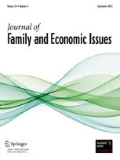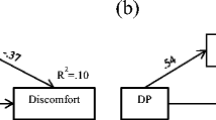Abstract
This study examines the role of financial socialization, financial knowledge, and receiving financial education on student loan repayment behaviors and related financial stress, as reported by the participants. From an analysis of the 2015 National Financial Capability Study dataset, we find that individuals who received financial education in an academic or professional setting were less likely to be late on student loan payments or worry about their student loan debt. Additionally, those who received both financial education and learned about finances from their parents were even less likely to worry about their student loan debt. The broader implications of the main findings for financial counselors, therapists, and planners are also discussed.

Similar content being viewed by others
Notes
All dollar values indicate US dollars.
References
Anong, S. T., & DeVaney, S. A. (2010). Determinants of adequate emergency funds including the effects of seeking professional advice and industry affiliation. Family and Consumer Sciences Research Journal, 38(4), 405–419.
Baum, S., & O’Malley, M. (2003). College on credit: How borrowers perceive their education debt. Journal of Student Financial Aid, 33(3), 7–19.
Baum, S., & Schwartz, S. (2006). How much is too much? Defining benchmarks for manageable student debt. New York: College Board.
Bayer, P. J., Bernheim, B. D., & Scholz, J. K. (2009). The effects of financial education in the workplace: Evidence from a survey of employers. Economic Inquiry, 47(4), 605–624. https://doi.org/10.1111/j.1465-7295.2008.00156.x.
Bernheim, B. D., & Garrett, D. M. (2003). The effects of financial education in the workplace: Evidence from a survey of households. Journal of Public Economics, 87(7–8), 1487–1519. https://doi.org/10.1016/S0047-2727(01)00184-0.
Bowen, C. F. (2002). Financial knowledge of teens and their parents. Journal of Financial Counseling and Planning, 12(2), 93–102.
Brown, M., Grigsby, J., Klaauw, W., Wen, J., & Zafar, B. (2016). Financial education and the debt behavior of the young. The Review of Financial Studies, 29(9), 2490–2522. https://doi.org/10.1093/rfs/hhw006.
Bureau of Labor Statistics. CPI inflation calculator. Available at https://www.bls.gov/data/inflation_calculator.htm.
Burgess, S. L. (1982). Determinants of home ownership: A comparison of single female and single male headed households. Housing and Society, 9(1), 87–94.
Campenhout, G. V. (2015). Revaluing the role of parents as financial socialization agents in youth financial literacy programs. Journal of Consumer Affairs, 49(1), 186–222. https://doi.org/10.1111/joca.12064.
College Board. (2017). Trends in higher education series: Trends in college pricing 2017. Retrieved from https://trends.collegeboard.org/sites/default/files/2017-trends-in-college-pricing_0.pdf.
Consumer Financial Protection Bureau. (2015). Annual report of the CFPB student loan ombudsman. Retrieved from https://files.consumerfinance.gov.
Consumer Financial Protection Bureau. (2017). CFPB finds percentage of borrowers with $20 k in student debt doubled over last decade. Retrieved from https://www.consumerfinance.gov/.
Danes, S. M. (1994). Parental perceptions of children’s financial socialization. Journal of Financial Counseling and Planning, 5, 127–146.
Fan, L. (2017). The influences of financial help-seeking and other information sources on consumer’s financial management behavior. (Unpublished doctoral dissertation). Athens, GA: The University of Georgia. Retrieved from https://athenaeum.libs.uga.edu/handle/10724/37313.
Fan, L., & Chatterjee, S. (2017). Borrowing decisions of households: An examination of the information search process. Journal of Financial Counseling and Planning, 28(1), 95–106.
Federal Reserve. (2016). Report on the economics well-being of U.S. households in 2015. Retrieved from https://www.federalreserve.gov/2015-report-economic-well-being-us-households-201605.pdf.
Fry, R. (2012). A record one-in-five households now owe student loan debt. Religion, 5, 12.
Garman, E. T., & Forgue, R. (2011). Personal finance. Boston: Cengage Learning.
Greiner, K. (1996). How much student loan debt is too much? Journal of Student Financial Aid, 26(1), 7–16.
Gundmunson, C. G., & Danes, S. M. (2011). Family financial socialization: Theory and critical review. Journal of Family Economic Issues, 32(4), 644–667. https://doi.org/10.1007/s10834-011-9275-y.
Hanna, S., & Lindamood, S. (1985). Ownership and ownership preference: A comparison of OLS and logit regressions. Housing and Society, 12(3), 133–146.
Hilgert, M. A., Hogarth, J. M., & Beverly, S. G. (2003). Household financial management: The connection between knowledge and behavior. Federal Reserve Bulletin, 89, 309–322.
Jin, Y., Rejesus, R. M., & Little, B. B. (2005). Binary choice models for rare events data: A crop insurance fraud application. Applied Economics, 37(7), 841–848.
Jorgensen, B. L., & Savla, J. (2010). Financial literacy of young adults: The importance of parental socialization. Interdisciplinary Journal of Applied Family Studies, 59(4), 65–478. https://doi.org/10.1111/j.1741-3729.2010.00616.x.
Kahn, J. R., & Pearlin, L. I. (2006). Financial strain over the life course and health among older adults. Journal of Health and Social Behavior, 47(1), 17–31.
Kim, J. (2007). Workplace financial education program: Does it have an impact on employee’s personal finances? Journal of Family and Consumer Sciences, 99(1), 43–47.
Kim, J., & Chatterjee, S. (2013). Childhood financial socialization and young adults’ financial management. Journal of Financial Counseling and Planning, 24(1), 61–79.
Kim, J., Kwon, J., & Anderson, E. A. (2005). Factors related to retirement confidence: Retirement preparation and workplace financial education. Journal of Financial Counseling and Planning, 16(2), 1–19.
King, T., & Bannon, E. (2002). The burden of borrowing: A report on the rising rates of student loan debt. The State PIRGs’ higher education project. Retrieved from https://eric.ed.gov/?id=ED470025.
Kinsey, J., & Lane, S. (1983). Race, housing attributes, and satisfaction with housing. Housing and Society, 10(3), 98–116.
Lee, J., & Mueller, J. A. (2014). Student loan debt literacy: A comparison of first-generation and continuing-generation college students. Journal of College Student Development, 55(7), 714–719. https://doi.org/10.1353/csd.2014.0074.
Lusardi, A. (2003). Saving and the effectiveness of financial education. Pension Research Council. https://doi.org/10.2139/ssrn.476022.
Lusardi, A., & Tufano, P. (2009). Debt literacy, financial experiences, and overindebtedness. NBER Working Paper 14808. Retrieved from http://www.nber.org/papers/w14808.
Lyons, A. C. (2004). A profile of financially at-risk college students. Journal of Consumer Affairs, 38(1), 56–80.
Moschis, G. P., & Churchill, Jr. G. A. (1978). Consumer socialization: A theoretical and empirical analysis. Journal of Marketing Research, 15(4), 599–609.
Mottola, G. R. (2013). In our best interest: Women, financial literacy, and credit card behavior. Numeracy, 6(2), 4.
Pindyck, R. S., & Rubinfeld, D. L. (1976). Econometric models and economic forecasts. New York: McGraw-Hill.
Pindyck, R. S., & Rubinfeld, D. L. (1988). Econometric models and economic forecasts. New York: McGraw-Hill Book Company.
Prawitz, A. D., & Cohart, J. (2014). Workplace financial education facilitates improvement in personal financial behaviors. Journal of Financial Counseling and Planning, 25(1), 5–26.
Ratcliffe, C., & McKernan, S. M. (2013). Forever in your debt: Who has student loan debt, and who’s worried. Washington, DC: Urban Institute.
Ratcliffe, C., & McKernan, S. M. (2015). Who is most worried about student-loan debt? Communities & Banking, 26(1), 29–31.
Robb, C. A., & Sharpe, D. L. (2009). Effect of personal financial knowledge on college students’ credit card behavior. Journal of Financial Counseling and Planning Volume, 20(1), 25–43.
Robb, C. A., & Woodyard, A. (2011). Financial knowledge and best practice behavior. Journal of Financial Counseling and Planning, 22(1), 60–70.
Schwartz, S., & Finnie, R. (2002). Student loans in Canada: An analysis of borrowing and repayment. Economics of Education Review, 21(5), 497–512.
Shim, S., Barber, B. L., Card, N. A., Xiao, J. J., & Serido, J. (2010). Financial socialization of first-year college students: The roles of parents, work and education. Journal of Youth and Adolescence, 39(12), 1457–1470. https://doi.org/10.1007/s10964-009-9432-x.
Shim, S., Serido, J., Bosch, L., & Tang, C. (2013). Financial identify-processing styles among young adults: A longitudinal study of socialization factors and consequences for financial capabilities. Journal of Consumer Affairs, 47(1), 128–152. https://doi.org/10.1111/joca.12002.
Skinner, J. (1988). Risky income, life cycle consumption, and precautionary savings. Journal of Monetary Economics, 22(2), 237–255.
Solheim, C. A., Zuiker, V. S., & Levchenko, P. (2011). Financial socialization family pathways: Reflections from college students’ narratives. Family Science Review, 16(2), 97–112.
Tang, N., Baker, A., & Peter, P. C. (2015). Investigating the disconnect between financial knowledge and behavior: The role of parental influence and psychological characteristics in responsible financial behaviors among young adults. Journal of Consumer Affairs, 49(2), 376–406. https://doi.org/10.1111/joca.12069.
Velez, E. D., & Woo, J. H. (2017). U.S. Department of education Stats in brief: The debt burden of Bachelor’s degree recipients. Retrieved from https://nces.ed.gov/pubs2017/2017436.pdf.
Wooldridge, J. M. (2010). Econometric analysis of cross section and panel data. Cambridge: The MIT press.
Wrosch, C., Heckhausen, J., & Lachman, M. E. (2000). Primary and secondary control strategies for managing health and financial stress across adulthood. Psychology and Aging, 15(3), 387.
Author information
Authors and Affiliations
Corresponding author
Ethics declarations
Ethical Approval
This article does not contain any studies with human participants or animals performed by any of the authors.
Appendix
Rights and permissions
About this article
Cite this article
Fan, L., Chatterjee, S. Financial Socialization, Financial Education, and Student Loan Debt. J Fam Econ Iss 40, 74–85 (2019). https://doi.org/10.1007/s10834-018-9589-0
Published:
Issue Date:
DOI: https://doi.org/10.1007/s10834-018-9589-0




